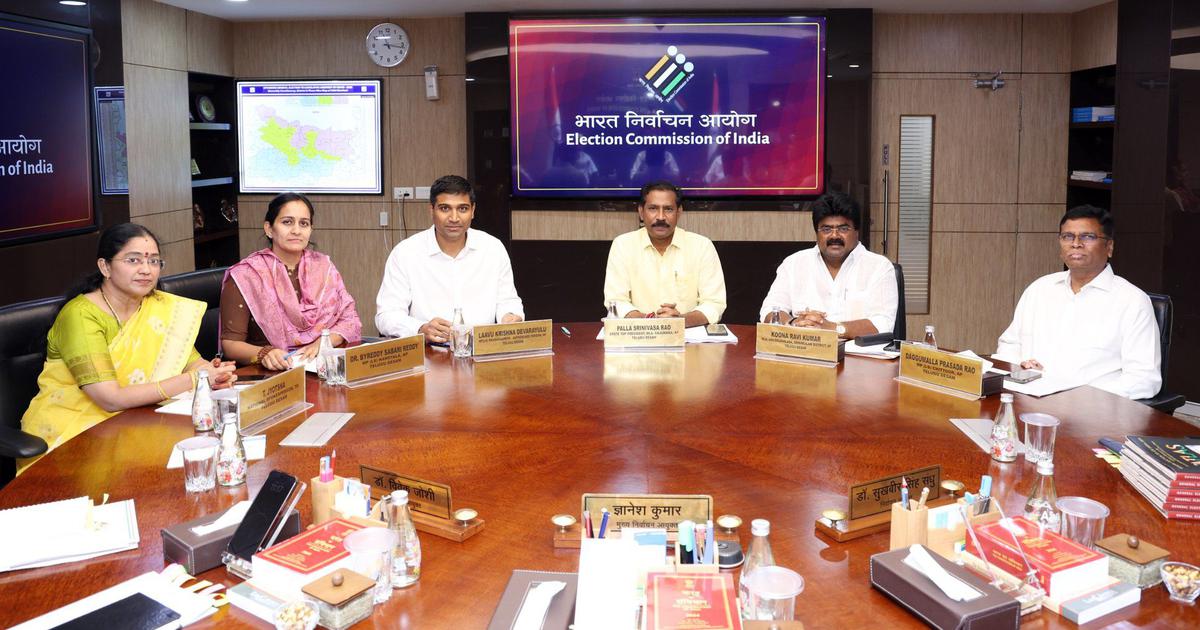TDP asks EC to clarify voter roll revision is not linked to ‘citizenship verification’
Such exercise should not be conducted ‘within six months of any major election’, said the BJP ally.

The Telugu Desam Party, an ally of the Bharatiya Janata Party at the Centre, on Tuesday urged the Election Commission to “clearly state” that the special intensive revision of voter rolls is not linked to citizenship verification, ANI reported.
In a letter to the poll body, the party also said that such exercises should be conducted with sufficient preparation time and “ideally not within six months of any major election”.
While the Telugu Desam Party did not explicitly mention the ongoing voter roll review in Bihar, the recommendations made by its parliamentary party leader Lavu Sri Krishna Devarayalu come amid a political row over the exercise in the poll-bound state.
The revision of the electoral rolls in Bihar was announced by the Election Commission on June 24. As part of the exercise, persons whose names were not on the 2003 voter list will need to submit proof of eligibility to vote. This means that 2.9 crore out of the state’s 7.8 crore voters – or about 37% of the electors – have to submit documentary evidence.
The Opposition parties have alleged that the special intensive revision of electoral rolls risked disenfranchising more than 2.5 crore voters, as they may not be able to produce the necessary documents.
In a letter to Chief Election Commissioner Gyanesh Kumar on Tuesday, the Telugu Desam Party proposed a series of reforms to “strengthen voter roll management and enhance transparency in the electoral process”.
“The scope of the SIR [special intensive revision] must be clearly defined and must be limited to electoral roll recorrection and inclusion,” the letter said. “It should be explicitly communicated that the exercise is not related to citizenship verification, and any field instructions must reflect this distinction.”
Voters enrolled in the most recent certified electoral roll should not be required to prove their eligibility “unless specific and verifiable reasons are recorded”, it added.
TDP MP Lavu Sri Krishna Devarayalu wrote to Chief Election Commissioner Gyanesh Kumar yesterday giving his party's suggestions to "strengthen electoral roll management and enhance transparency in the electoral process". Writing on Special Intensive Revision (SIR) in the context… pic.twitter.com/olWfdS0ite
— ANI (@ANI) July 16, 2025
The Telugu Desam Party was part of the National Democratic Alliance from 1998 to 2004 and then between 2014 and 2018. In March 2018, the party quit the alliance, citing the BJP-led Union government’s refusal to grant Andhra Pradesh special category status.
In 2024, the party once again joined the alliance ahead of the Lok Sabha elections.
In its letter, the party, now in power in Andhra Pradesh, also highlighted the southern state’s high levels of seasonal migration.
It urged the Election Commission to deploy mobile units that accept temporary address declarations to prevent the exclusion of migrant workers and displaced families.
Among other recommendations, the party called for the issuance of unique, non-replicable Electors Photo Identity Card numbers and the introduction of Aadhaar-based cross-verification with data privacy safeguards.
It also suggested replacing the current ink-based voter verification system with a biometric one.
The letter was submitted after a Telugu Desam Party delegation met with the election commissioners in New Delhi on Tuesday.
What is the exercise in Bihar?
Bihar has 7.9 crore registered voters, according to the Election Commission. Between June 25 and July 26, booth-level officers, or BLOs, in Bihar will go door-to-door to verify if these voters are genuine.
If the officers are satisfied, the voters will be re-enrolled to a new voter list by electoral registration officers, or EROs, who are usually officials from the local administration. If not, they will be removed from the voter lists. A draft roll will be published on August 1 and the final roll will be out on September 30.
This process is called a special intensive revision and it was last held in Bihar in 2003.
The EC’s 2023 manual on electoral rolls says that in such a revision, BLOs visit every household in his assigned area and note down “all relevant particulars of the eligible persons staying in each house” in an electoral card.
Based on these cards, which are checked by senior election officials, the EC prepares a written manuscript.
“Thereafter, the manuscript is computerised and a draft roll is prepared and published, inviting claims and objections,” says the manual. “After disposal of such claims and objections, the roll is finally published.”
Also read:
Bihar voter roll revision: Why having to prove you are an Indian citizen is a nightmare
The curious case of a missing Election Commission order on 2003 voter list revision in Bihar









